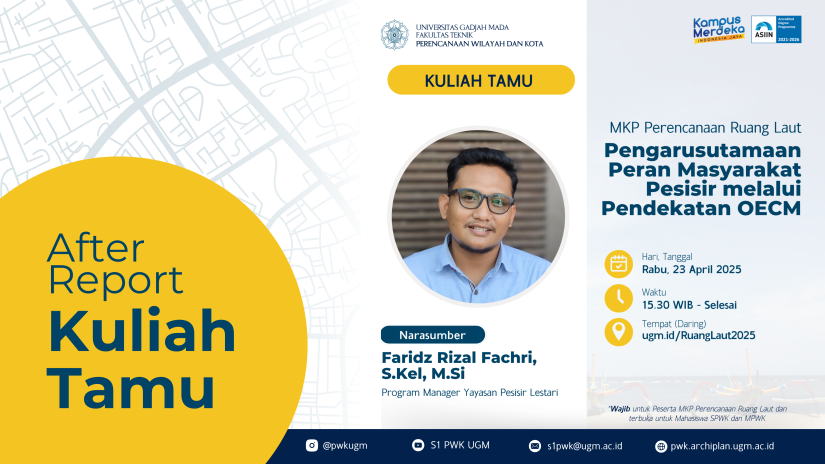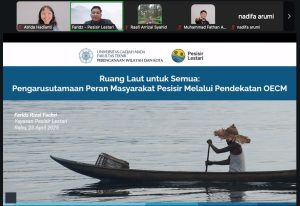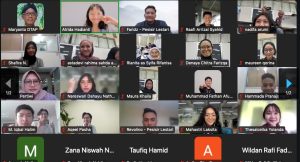
Yogyakarta, April 23, 2025 – The Undergraduate Program in Urban and Regional Planning held a guest lecture on Wednesday, April 23, 2025, titled “Mainstreaming the Role of Coastal Communities through the OECM Approach”, featuring Faridz Rizal Fachri, S.Kel, M.Si., a practitioner and Program Manager at the Yayasan Pesisir Lestari, as the guest speaker.
The lecture was held virtually and was attended by students from the Urban and Regional Planning Undergraduate Program at UGM as well as members of the general public.
This guest lecture aimed to deepen understanding of the critical role that coastal communities play in protecting marine and coastal spaces. Faridz Rizal Fachri emphasized that, in practice, communities are often excluded from marine spatial planning and governance efforts. This presents a growing challenge in the current era of rapid development. Spatial planning and coastal area management that disregard the presence of local communities continue to raise serious concerns—such as the displacement of the Bajo people due to electric vehicle development projects, or the controversy surrounding the sea wall in Tangerang that drew national attention.
To address these issues, the OECM (Other Effective Area-Based Conservation Measures) approach can be applied. OECM serves as a form of biodiversity protection in marine and coastal areas, whether or not these areas are officially designated as conservation zones. Unlike marine national parks or legally protected zones, OECM areas are managed outside the formal conservation system and emphasize community-based preservation.
This approach considers not only environmental aspects, but also human dimensions—recognizing ecosystem services for communities to meet their needs, as well as acknowledging the rights of Indigenous peoples. OECM focuses on community participation and aligns closely with multi-stakeholder and cross-sectoral approaches in achieving Indonesia’s Conservation Vision, which aims to protect 30% of the country’s coastal and marine areas by 2045.
Mainstreaming the role of coastal communities through the OECM approach aligns with several Sustainable Development Goals (SDGs), including:
-
SDG 8: Decent Work and Economic Growth
-
SDG 10: Reduced Inequalities
-
SDG 14: Life Below Water
-
SDG 17: Partnerships for the Goals
Beyond protecting marine and coastal ecosystems, the OECM approach offers equal and inclusive opportunities for local communities—both socially and economically. The ocean provides invaluable benefits, and humans must use it wisely to sustain life. Those who live in and care for these environments should not be marginalized in development efforts.
This guest lecture provided meaningful insights for all participants, especially students. It highlighted the importance of seeing the bigger picture as a planner—one must consider multiple aspects and elements. A planner is not just responsible for designing empty spaces filled with infrastructure, but must also deeply understand the critical social context within which they plan.


